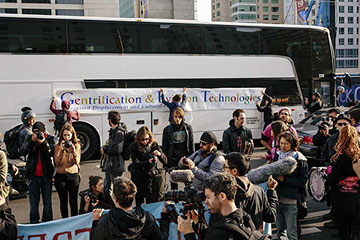
Protesters who blame tech wealth for San Francisco's soaring housing costs blockade a private shuttle filled with Google employees.
(3 of 4)
The tension between those moving in and those getting pushed out is fueled every morning as comfy private shuttles pull up to city bus stops. Known as Google buses, the often double-decker, wi-fi-equipped coaches ferry employees of Google, Facebook, LinkedIn and other tech firms from their homes in the city south to the duller corporate campuses in Silicon Valley. The luxe vehicles have become the defining symbol of the city's stratification--and the prime target for those angry about it. Their ire is directed at riders bound for jobs whose median salary might be $100,000 and the median employee age 29 and at real estate brokers who are using proximity to the shuttle stops to charge more for nearby apartments. "When you see people who are making a lot of money and other people who are really making a lot of money, that rubs some people the wrong way," says city supervisor Scott Wiener. The city plans to start regulating the shuttles and charge them $1 per stop, but the plan has only fanned the flames among residents who pay $2 per person to ride city buses.
On the day in late January that a city committee approved the bus-stop charge, dozens of protesters followed a brass band down Market Street holding signs with messages like $1 doesn't stop displacement. The parade came to a halt at an intersection and surrounded two buses, one bound for Facebook, one for Google. "This was a great place to live, but not anymore," an activist named Erin McElroy said through a megaphone. "If you're living in rent-controlled housing, you're probably going to get evicted so somebody making way more money than we'll ever make can move in." Bus passengers filmed the scene with their smartphones, as other employees frantically motioned for the driver to let them on. While some protesters made their case in reasonable tones, others unfurled a giant banner with a less nuanced sentiment: F-ck off, Google.
Talk to anyone about the buses long enough, and the conversation has a way of getting around to a more fundamental question: What gives a person the right to live in a place? "There's been this debate of people with more wealth saying, 'Well, if you don't have enough money, then you need to move to a cheaper city,'" says Leslie Dreyer, a graphic designer who helped organize a bus protest. "That's not taking into account their roots, their community, their needs or anything else."
The view looks different from inside the shuttle. Prominent venture capitalist Tom Perkins publicly compared San Francisco's "rising tide of hatred of the successful" to the Nazis' hatred of the Jews. (He later apologized for his choice of words.) At a focus group for a new startup held in the city's SoMa district, one young entrepreneur made the less incendiary argument that protesters are exhibiting an "undiagnosed" sense of entitlement when they presume to control who gets to live in a neighborhood. "I hate seeing a change where the character of a neighborhood gets a shock," says Mayor Ed Lee. "So what do you do about it? Part of it, you can't do a whole lot because we have freedom. We can't control everything."
Blinded by the Boom
